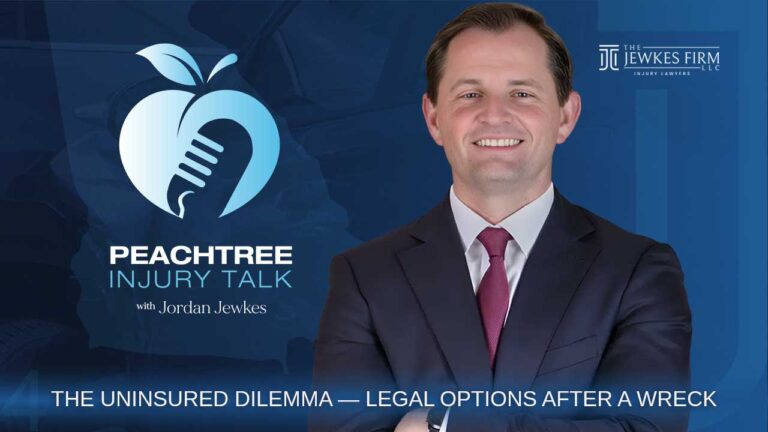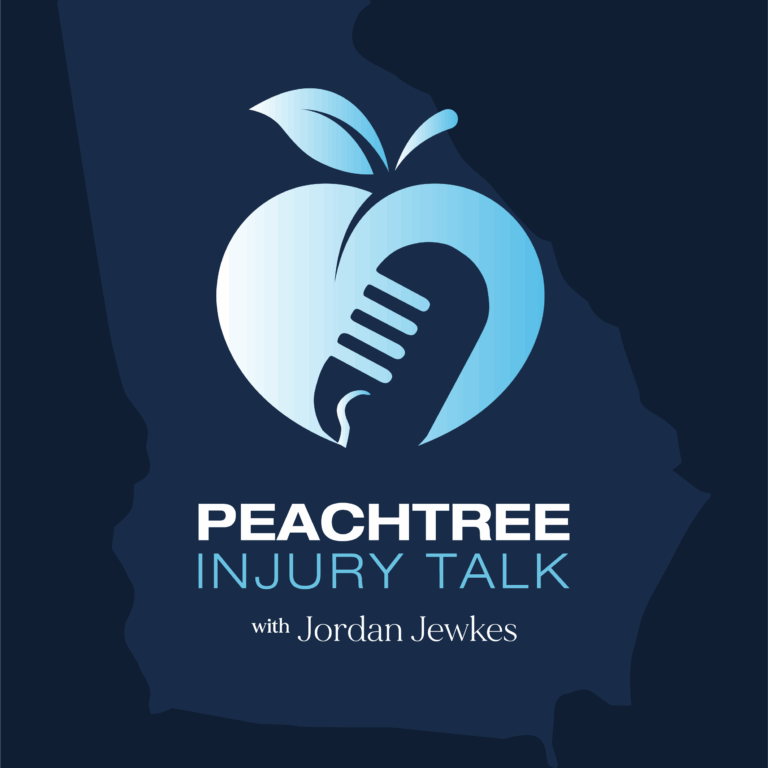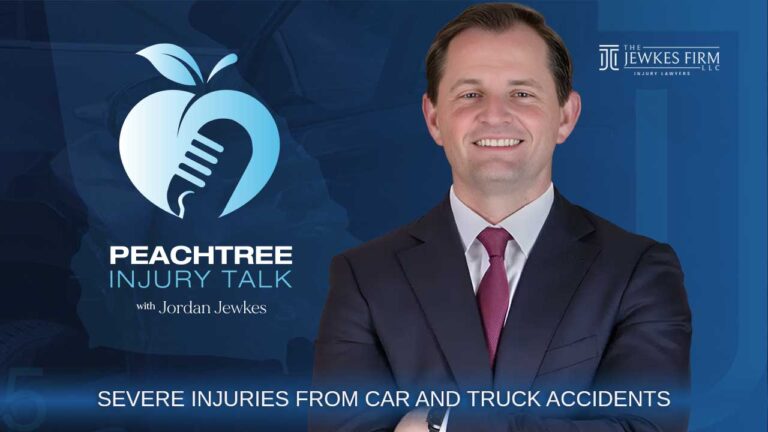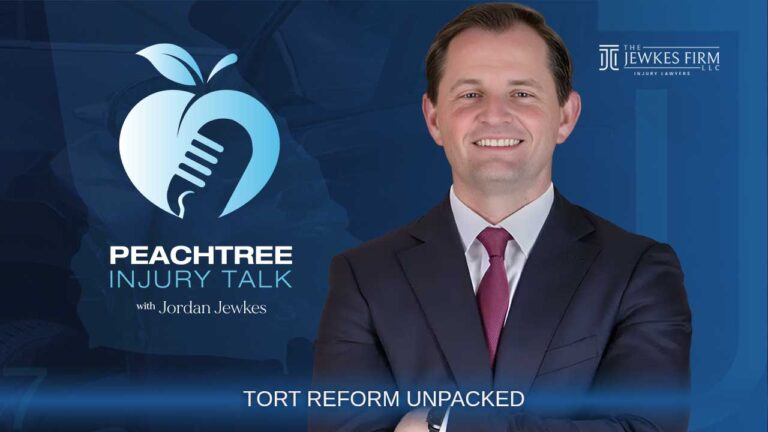
The Uninsured Dilemma — Legal Options After A Wreck
In this episode of Peachtree Injury Talk, attorney Jordan Jewkes discusses the critical topic of uninsured and underinsured motorists in Georgia. Jordan explains what uninsured
Home | Podcasts | Peachtree Injury Talk | Understanding Georgia Wrongful Death Claims
Peachtree Injury Talk with Jordan Jewkes
In this episode of Peachtree Injury Talk, attorney Jordan Jewkes breaks down the process of wrongful death claims in Georgia, discussing situations such as car accidents, medical malpractice, and unsafe construction. He explains the two types of claims: wrongful death (focused on the value of the deceased person’s life) and estate claims (covering pain, suffering, medical bills, and funeral costs). Jewkes also covers who can file a claim, the importance of preserving evidence, the types of recoverable damages (including lost wages), and the emotional challenges families face during the process.
| 00:00 | Narrator: Welcome to Peachtree Injury Talk with attorney Jordan Jewkes. |
| 00:05 | Kevin Rosenquist: Welcome to Peachtree Injury Talk with experienced attorney Jordan Jewkes. Thanks so much for being here. My name is Kevin Rosenquist, and today we're going to talk about Georgia wrongful death claims. Jordan, great to see you. |
| 00:17 | Jordan Jewkes: Thanks, Kevin. I enjoy speaking with you—glad to be back. |
| 00:22 | Kevin Rosenquist: So, can you start by telling our listeners what exactly constitutes a wrongful death claim in Georgia? |
| 00:28 | Jordan Jewkes: Yeah, and this is a very serious and unfortunate subject. A wrongful death claim in Georgia is generally defined as when a person causes the death of another through negligence. And when we say "negligence," we’re talking about accidents—unintentional actions. If it’s done on purpose, that becomes a criminal act like homicide. But in civil litigation, it’s when someone negligently causes another person's death, which often happens in car wrecks or similar incidents. |
| 01:02 | Kevin Rosenquist: What other types of incidents can lead to wrongful death claims? |
| 01:05 | Jordan Jewkes: They can happen in a variety of contexts. Car and trucking wrecks are very common. Medical malpractice is another big one—if a doctor does something wrong, for instance. We had a case where a mentally ill person was allowed to leave the hospital unsupervised, without notifying the family, and that person passed away shortly after. That resulted in a claim against the hospital. Wrongful death can also arise from unsafe structures—say, a worker falls from a platform that wasn’t built to code. All of those fall under wrongful death scenarios. |
| 01:51 | Kevin Rosenquist: Who is eligible to file a wrongful death claim in Georgia? |
| 01:55 | Jordan Jewkes: That’s a really good question. It depends on the family structure of the deceased. Typically, the spouse has the primary right to file. If there’s no spouse, then it passes to the children. If there are no children, then to the parents. And if there are no living parents, spouse, or children, the court can appoint someone—often a close friend—to represent the estate. Sometimes more than one person tries to file a claim, and while that can happen, it’s best to avoid it because it usually leads to disputes. |
| 02:43 | Kevin Rosenquist: What’s the process like for filing a claim? |
| 02:47 | Jordan Jewkes: You need to notify the insurance company and begin the claim process like you would for any injury claim. But with wrongful death, there are actually two distinct types of claims that can be filed: the wrongful death claim and the estate claim. The wrongful death claim is for the value of the person’s life, which may seem obvious. But the estate claim is different—it’s brought by the deceased person’s estate and seeks compensation for things like funeral expenses, medical bills, and even the mental anguish the person experienced before death. For instance, if someone was at a stop sign and saw an 18-wheeler coming at them, knowing they were about to be hit—that fear, that fright, is something the estate can seek compensation for. It can be significant. |
| 03:34 | Kevin Rosenquist: So is it just that people don’t know about the estate claim, or are there situations where you can’t file both? |
| 03:37 | Jordan Jewkes: It’s mostly that people don’t know they can file both. There are cases where the estate claim may be small—maybe just funeral expenses if the death was instant and painless. But in many other cases, it’s very important to pursue both. A competent attorney will usually recommend filing both claims. |
| 05:29 | Kevin Rosenquist: Do you recommend reaching out to an attorney right away? |
| 05:32 | Jordan Jewkes: Ideally, yes. But understandably, when you're grieving, that’s not your first thought. Still, there’s often important evidence—scene photos, video footage, witness interviews—that can be lost if not gathered early. Just making a quick call to an attorney can get the wheels turning behind the scenes so that evidence is preserved while you focus on grieving. |
| 06:40 | Kevin Rosenquist: That makes sense. Even small things like a funeral brochure can be important, right? |
| 06:48 | Jordan Jewkes: Exactly. It might sound strange, but what’s said at a funeral and what’s printed in the program can be powerful evidence. Funerals tell the story of a person’s life—who they were, how they were loved, what they contributed. That kind of documentation can help paint a picture for a jury or insurance adjuster. |
| 07:30 | Kevin Rosenquist: What kinds of damages can be recovered? |
| 07:33 | Jordan Jewkes: On the estate side, damages include funeral costs, medical bills, and any pain and suffering the person experienced before passing. On the wrongful death side, it’s about the value of the person’s life. That can be difficult to quantify. How do you value the life of a baby? An elderly parent? The law allows us to determine that value through the eyes of family, friends, coworkers—those who knew and loved them. |
| 08:47 | Kevin Rosenquist: Are there general guidelines for determining compensation? |
| 08:54 | Jordan Jewkes: There’s no set formula. It’s really case by case. There’s no statute that says, “This age equals this much value.” You need an attorney who knows how to gather evidence and present it effectively to maximize the claim’s value. |
| 09:31 | Kevin Rosenquist: What about lost wages? |
| 09:34 | Jordan Jewkes: Absolutely. That’s a big part of many cases, especially if the deceased was a high earner like a doctor. Lost income can be recovered through the estate claim, and it can be substantial. Again, that’s why it’s important to file both the estate and wrongful death claims properly. |
| 10:22 | Kevin Rosenquist: What are some of the biggest challenges families face when going through this? |
| 10:27 | Jordan Jewkes: The biggest challenge is emotional. You're grieving, you’re dealing with loss, and now you have to take on a legal battle. No one volunteers for this. It's painful. Every hearing, every deposition—it’s like reliving the funeral. Families just want to move on and heal, but the process can keep reopening the wound. |
| 11:55 | Kevin Rosenquist: Especially tough if the insurance company pushes back. |
| 11:59 | Jordan Jewkes: Yeah, and unfortunately, they usually do. They’ll deny liability or try to minimize damages. And in cases like medical malpractice, they’re almost always hotly contested and hard to prove. That’s why it’s critical to have experienced legal help. |
| 12:40 | Kevin Rosenquist: Is there a time limit for filing? |
| 12:44 | Jordan Jewkes: Yes, there’s a statute of limitations—generally, two years. It won’t be less than that, but there are exceptions depending on the case. Either way, if you suspect negligence played a role, you should talk to an attorney as soon as possible to protect your rights. |
| 13:24 | Kevin Rosenquist: How does your firm help support families through this? |
| 13:25 | Jordan Jewkes: We try to be more than just legal representatives. We treat clients like family. We want to listen, offer guidance, and be someone they can lean on—emotionally and legally. It’s not always about telling people what they want to hear; it’s about telling them what they need to hear, with honesty and compassion. |
| 14:04 | Kevin Rosenquist: Does it get emotionally tough for you as well? |
| 14:11 | Jordan Jewkes: Absolutely. You can’t be human and not feel for your clients. When someone places their trust in you during the worst time of their life, you become part of their story—and part of their healing. You feel the loss with them. But that connection helps you tell their story more powerfully and advocate more effectively. |
| 15:12 | Kevin Rosenquist: And these cases can take time, I assume? |
| 15:16 | Jordan Jewkes: Yes, they can take months or even years—especially if they involve trucking accidents or if Georgia State Patrol’s Specialized Crash Reconstruction Team (SCRT) gets involved. Their investigations are thorough but time-consuming. And that makes it even more important to have a compassionate, experienced legal team helping the family through it all. |
| 16:19 | Kevin Rosenquist: Yeah, and I’m not trying to be salesy here, but having an attorney who can take that burden off a grieving family really is huge. |
| 16:24 | Jordan Jewkes: You’re exactly right. Just being able to say, “Let us handle the legal side so you can grieve”—that’s what we’re here for. |
| 16:38 | Kevin Rosenquist: Heavy topic, but an important one. Thanks again for joining us today on Peachtree Injury Talk with experienced attorney Jordan Jewkes. If you'd like to get in touch with Jordan, his website is jewkesfirm.com (http://jewkesfirm.com). Please like and subscribe to the channel and stay up to date with everything Georgia injury law. Jordan, always great to see you. Thanks for all the info. |
| 16:58 | Jordan Jewkes: You too. Thanks so much. |
| 17:00 | Narrator: Thanks for watching. Be sure to hit that like and subscribe button and leave us a review in the comments. |

Peachtree Injury Talk is a podcast by Kevin Rosenquist featuring legal insights and practical advice from Georgia-based attorney Jordan Jewkes. The show focuses on personal injury law, offering listeners expert guidance on navigating insurance claims, understanding legal processes, and protecting their rights after an accident. Each episode dives into real-life case examples, common challenges injured individuals face, and actionable tips for dealing with insurance companies and legal hurdles.
Episode Summary
In this episode of Peachtree Injury Talk, attorney Jordan Jewkes and host Katie Roberts explore the concept of comparative negligence and its impact on personal injury cases in Georgia. Jordan breaks down how fault is assessed, what percentage of liability can mean for a claim, and when it’s worth taking a case to trial. The discussion also covers real-life case examples, the importance of dash cams, and how insurance companies use comparative negligence in negotiations. If you’ve ever wondered how fault is determined in a car accident or what to do after a crash, this episode is a must-listen.
Timestamps
00:00 – Welcome to Peachtree Injury Talk with attorney Jordan Jewkess
00:05 – Introduction to today’s topic: The Fine Line of Faul
t 00:32 – What is comparative negligence?
01:47 – How comparative negligence is used in evaluating personal injury cases
03:23 – Who decides the percentage of fault in a case?
04:33 – Should you take a case to trial if the fault is unclear?
06:22 – Balancing risk and reward when pursuing a case
09:55 – The importance of thorough investigations and gut instincts in legal decisions
10:30 – What should you do immediately after a car accident?
12:41 – Why admitting fault (or even apologizing) can hurt your case
13:09 – Staged accidents: Are they real or just social media hype?
14:47 – Should everyone have a dash cam?
16:04 – How insurance companies use comparative negligence to reduce payouts 17:11 – The impact of comparative negligence on pain and suffering claims
About the Show
Peachtree Injury Talk is hosted by attorney Jordan Jewkes, dedicated to providing injured victims with strong advocacy in a system that often feels stacked against them. Through legal insights and real-world examples, Jordan helps listeners understand their rights and navigate the complexities of personal injury law.

Understanding Georgia Wrongful Death Claims focuses on the legal framework, the process of filing claims, and the emotional and practical challenges families face when dealing with a wrongful death claim in Georgia.
Jordan begins by explaining that a wrongful death claim arises when another’s negligence causes a person’s death, often in accidents like car crashes or medical malpractice. These claims are civil matters, as opposed to criminal actions like homicide. Common scenarios for wrongful death include car and trucking accidents, medical malpractice, and unsafe working conditions, such as faulty construction sites leading to accidents. Jordan highlights a case involving a hospital’s failure to supervise a mentally ill patient, which resulted in wrongful death claims.
The next topic addresses eligibility to file a wrongful death claim in Georgia. Typically, the spouse of the deceased holds the primary right to file, followed by children if there is no spouse. If neither is available, parents can file the claim. In cases with no close relatives, a court may appoint someone to represent the deceased’s estate. Jordan advises against multiple parties filing claims, as this often leads to disputes.
Jordan explains the two types of claims: the wrongful death claim and the estate claim. The wrongful death claim compensates for the loss of the deceased’s life, while the estate claim covers funeral expenses, medical bills, and any mental anguish the deceased may have experienced before death. The estate claim can also include compensation for emotional distress, such as the fear a person may have experienced before their passing in a traumatic accident.
Kevin asks if it’s possible to file both claims. Jordan confirms that people often find it important to do so, though many people don’t know about the estate claim. He recommends contacting an attorney early in the process to ensure they preserve valuable evidence, such as scene photos or witness statements. Jordan also points out that even something seemingly insignificant, like a funeral program, can serve as important evidence to demonstrate the deceased’s life and impact.
In terms of damages, Jordan outlines that estate claims can cover funeral costs, medical bills, and pain and suffering, while wrongful death claims focus on the value of the deceased’s life. Determining that value is complex and depends on the input of family, friends, and colleagues who knew the person. Lost wages, particularly in cases involving high earners, can be a significant part of the recovery.
Jordan emphasizes that these cases are emotionally challenging for families. The legal process compounds grief, which can feel like re-opening the wound, especially when insurance companies push back or deny claims. He advises seeking legal help promptly to navigate the emotional and logistical challenges.
Lastly, Jordan stresses the importance of filing claims within the statute of limitations, which is generally two years in Georgia, though exceptions may apply. He reassures that his firm strives to provide not only legal support but also emotional guidance, treating clients like family through such trying times. The episode concludes with Kevin encouraging viewers to reach out to Jordan for assistance, stressing the vital role of experienced attorneys in easing the burden on grieving families. For more information, reach out to The Jewkes Law Firm at (770) 771-5130.
Welcome to Peachtree Injury Talk—your essential podcast for navigating the often bewildering landscape of personal injury law. In each episode, join Attorney Jordan Jewkes as he unpacks the complexities surrounding your rights in the unfortunate event of an accident.
Through engaging dialogue and expert insights, Jordan demystifies legal jargon. He presents practical, applicable, and relatable scenarios that will resonate with listeners. Whether you’re dealing with the aftermath of a car accident, a slip and fall incident, or any other personal injury matter, Peachtree Injury Talk aims to empower you with the knowledge you need.
Each episode is designed to be accessible and informative. Thus, making it easier for you to understand the steps you should take to protect yourself and your interests. Jordan Jewkes shares real-life cases, common pitfalls to avoid, and tips on securing the compensation you deserve.
Additionally, the podcast fosters a community atmosphere where listeners can feel comfortable asking questions and seeking guidance. This supportive environment is a testament to The Jewkes Firm’s commitment to helping individuals understand their legal options.
So, whether you’re a seasoned listener or tuning in for the first time, prepare to arm yourself with valuable insights that can significantly influence your recovery journey. Tune in to Peachtree Injury Talk. Equip yourself with the vital information needed to navigate your rights confidently and get the support you deserve!
This show is designed to deliver general information regarding the law. Our guests will not provide tailored legal advice. If you have a personal issue and need legal support, get in touch with us for a free consultation with a Jewkes Firm attorney.
Subscribe to our newsletter for essential updates and expert legal advice.

In this episode of Peachtree Injury Talk, attorney Jordan Jewkes discusses the critical topic of uninsured and underinsured motorists in Georgia. Jordan explains what uninsured

In this episode of Peachtree Injury Talk, attorney Jordan Jewkes discusses severe injuries that result from car and truck accidents in Georgia. He highlights common

In this episode, Jordan shares his perspective on why tort reform often benefits large corporations at the expense of individual rights and access to fair
The information you obtain at this site is not, nor is it intended to be, legal advice. You should consult an attorney for advice regarding your individual situation. Contacting us does not create an attorney-client relationship.
